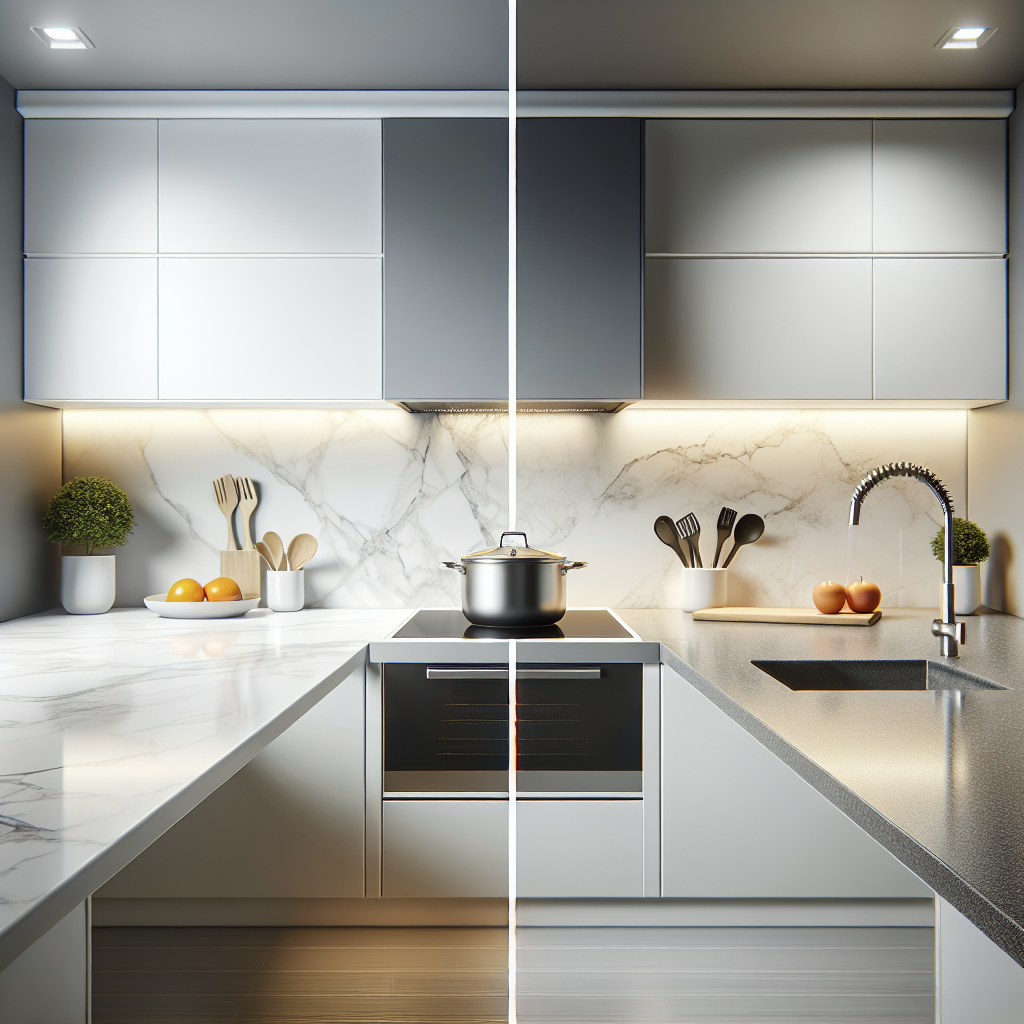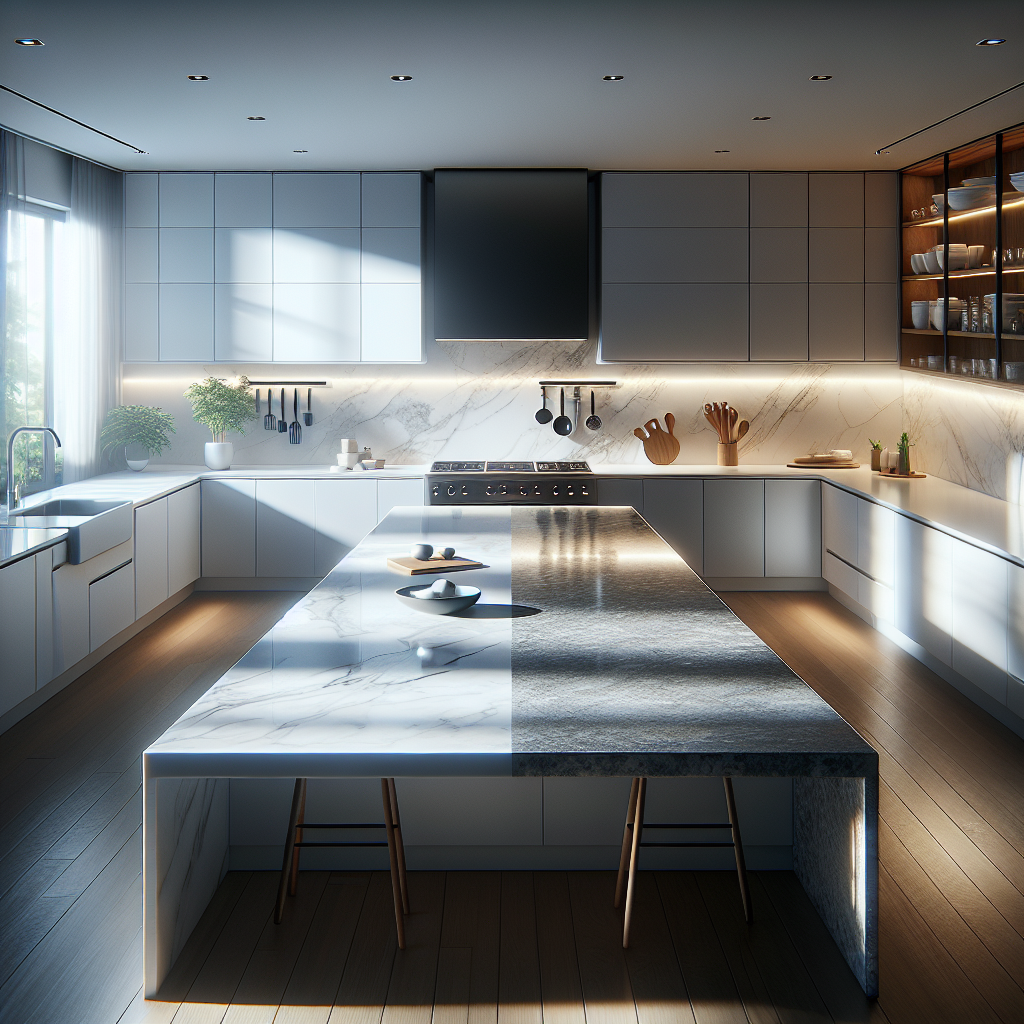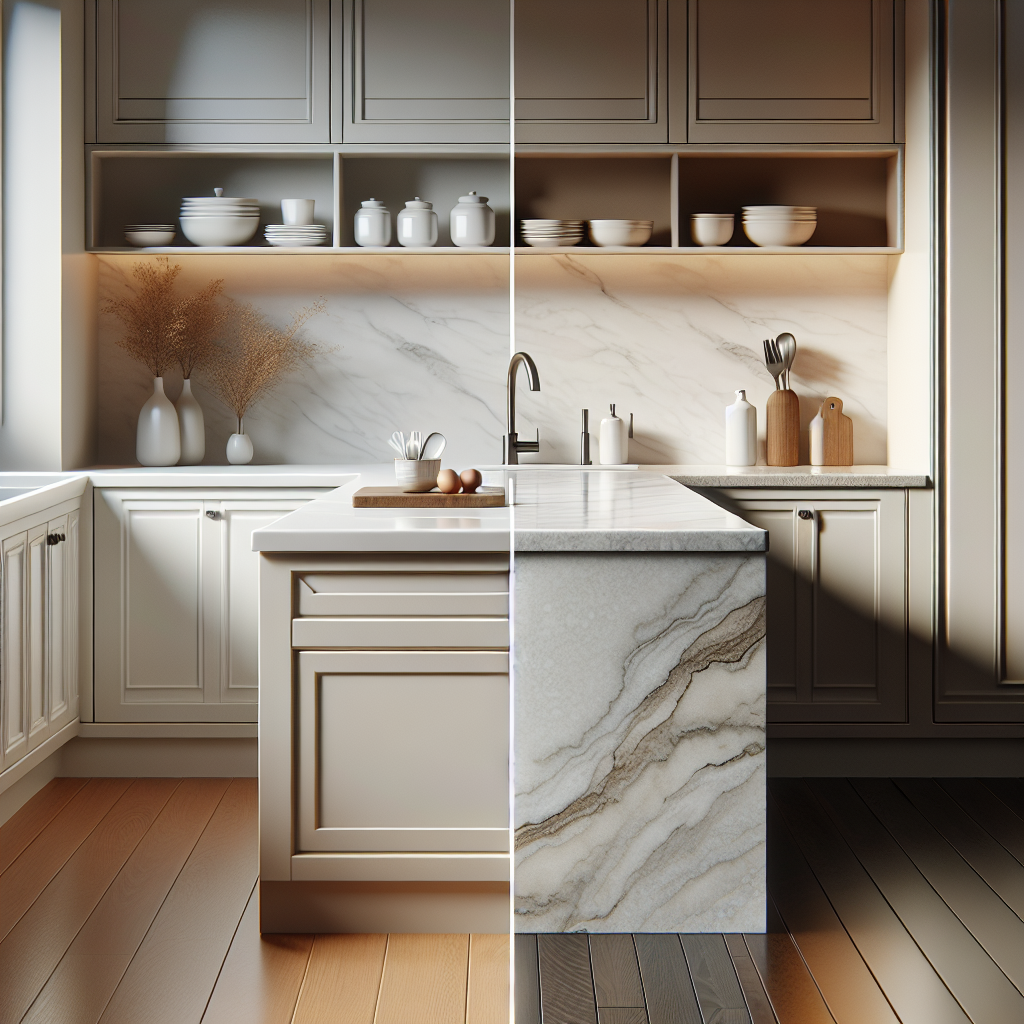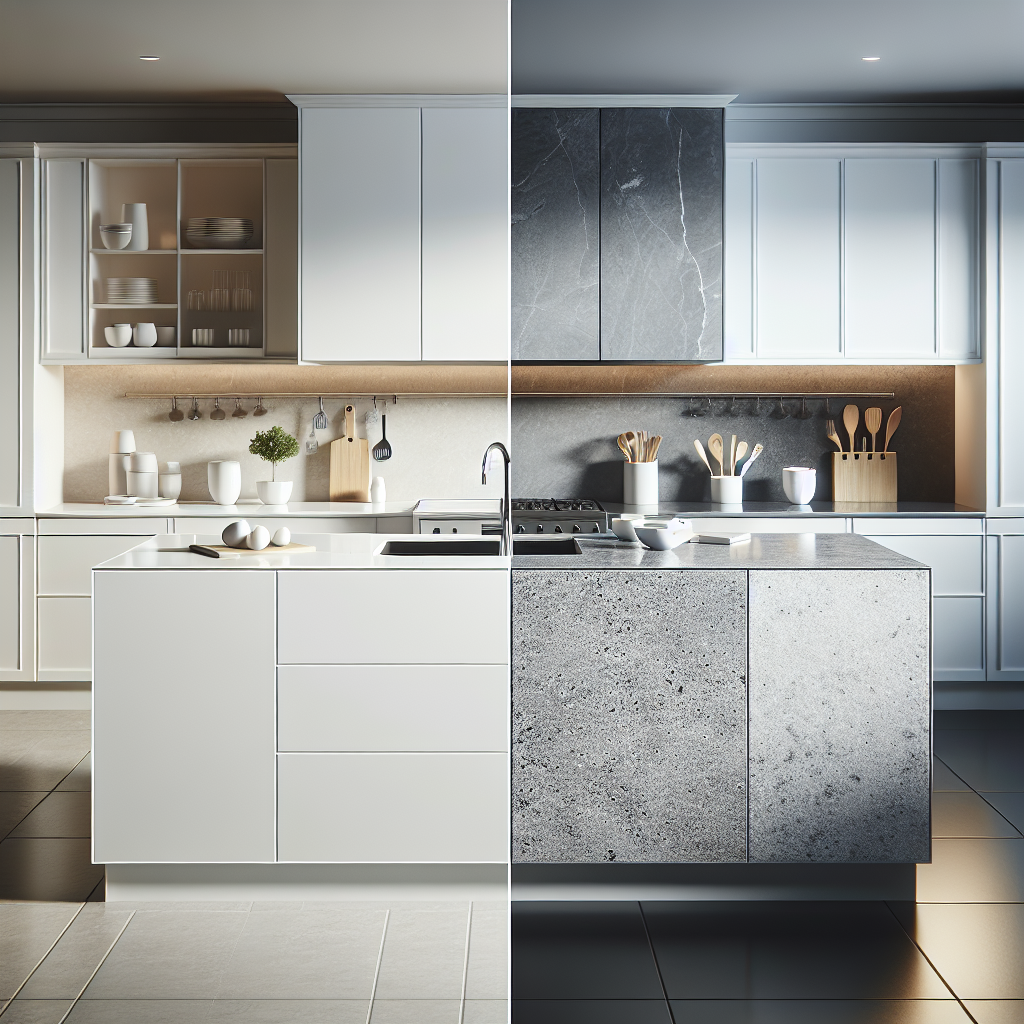When it comes to home renovations, particularly in the kitchen, choosing the right countertop material is crucial. Among the myriad of options available, porcelain and quartz countertops stand out for their exceptional qualities and stunning aesthetics. Both materials offer unique benefits, making them popular choices for homeowners looking to enhance their kitchen spaces.
Porcelain countertops are known for their remarkable durability and resistance to high temperatures. Made from a refined clay baked at extremely high temperatures, porcelain surfaces are non-porous, stain-resistant, and remarkably easy to maintain. These features make porcelain an excellent choice for busy kitchens where spills and heat exposure are common.
On the other hand, quartz countertops are engineered from natural quartz crystals combined with resins and pigments. This process results in a highly durable and non-porous surface, resistant to stains, scratches, and heat. Quartz countertops offer a wide variety of colors and patterns, allowing homeowners to achieve the look of natural stone with added durability and lower maintenance.
Choosing between porcelain and quartz for your kitchen renovation can be challenging, but understanding the distinct features and benefits of each can help you make an informed decision. Stay tuned as we delve deeper into the specific advantages and disadvantages of porcelain vs quartz countertops.
Call us today at (954) 781-7370 for a free quote!
Durability and Maintenance Comparison

When comparing porcelain vs quartz countertops, one of the most critical factors to consider is durability and maintenance. Both materials are prized for their strength, but they have unique characteristics that influence their longevity and upkeep.
Porcelain countertops are celebrated for their exceptional durability. They are highly resistant to heat, scratches, and stains, making them an ideal choice for a bustling kitchen environment. Because porcelain is non-porous, it doesn’t absorb liquids, which means it won’t harbor bacteria or stains. This quality not only enhances the countertop’s durability but also makes it incredibly easy to clean. Simply wiping the surface with a damp cloth and mild detergent is usually sufficient to keep it looking pristine.
Quartz countertops also boast impressive durability. Engineered to be even harder than natural stone, quartz surfaces resist scratches and chips exceptionally well. They are also non-porous, which means they are resistant to stains from common kitchen substances like wine, coffee, and oils. One of the standout features of quartz is its low maintenance requirement. The surface does not need to be sealed, unlike some natural stones, and regular cleaning with soapy water is typically all that’s needed to maintain its appearance.
In summary, both porcelain and quartz countertops offer outstanding durability and are easy to maintain. However, the choice between the two may come down to specific preferences for heat resistance, scratch resistance, and the overall aesthetic you desire for your kitchen.
Aesthetic Appeal and Customization

The aesthetic appeal and customization options of porcelain vs quartz countertops are crucial considerations when planning your kitchen renovation. Both materials offer unique visual qualities and a range of design possibilities that can transform your kitchen into a stunning space.
Porcelain countertops are renowned for their ability to mimic the look of natural stone, such as marble or granite, thanks to advanced manufacturing techniques. This allows homeowners to achieve a luxurious appearance without the high cost associated with natural stone. Porcelain is available in a wide array of colors, patterns, and finishes, providing ample opportunities for customization. Whether you prefer a sleek, modern look or a classic, timeless aesthetic, porcelain can be tailored to match your vision.
Quartz countertops, on the other hand, are engineered to provide a consistent and uniform appearance. This consistency is achieved by blending natural quartz crystals with resins and pigments, resulting in a product that can be crafted in virtually any color or pattern imaginable. Quartz surfaces can replicate the look of natural stone but also offer unique designs that are not available in nature. The customization options for quartz are extensive, allowing you to choose from a variety of hues, veining patterns, and textures to perfectly complement your kitchen decor.
Both porcelain and quartz countertops can be fabricated to include custom edges and finishes, enhancing their visual appeal and ensuring a seamless fit with your kitchen’s overall design. Whether you desire the natural stone look of porcelain or the tailored elegance of quartz, both materials provide versatile and attractive options to meet your aesthetic goals.
Cost Considerations for Homeowners

When comparing porcelain vs quartz countertops, cost considerations play a significant role in the decision-making process for homeowners. Both materials offer a range of price points, but several factors can influence the overall expense of your countertop installation.
Porcelain countertops tend to be more affordable than quartz, especially when you factor in the cost of high-end natural stones they often replicate. The price of porcelain countertops can vary depending on the quality, design, and thickness of the material. Additionally, since porcelain is lighter than quartz, installation costs can be lower due to easier handling and reduced labor requirements. However, it is essential to consider the potential need for specialized cutting and installation techniques, which can add to the overall expense.
Quartz countertops, while generally more expensive upfront, offer long-term value due to their durability and low maintenance requirements. The cost of quartz countertops is influenced by the brand, color, pattern, and thickness of the slabs. Customization options, such as unique edge profiles and integrated sinks, can also increase the total cost. Despite the higher initial investment, many homeowners find that the longevity and ease of care provided by quartz justify the expense.
Both porcelain and quartz have their own set of cost implications, and it is crucial to evaluate your budget and priorities when making a decision. While porcelain may offer a more budget-friendly option with a luxurious appearance, quartz provides unmatched durability and a wide array of design possibilities that can enhance the value of your home in the long run.
Installation Process and Requirements

The installation process and requirements for porcelain vs quartz countertops are distinct, each with its own set of challenges and considerations. Understanding these differences can help homeowners make an informed decision based on their specific needs and preferences.
Porcelain countertops are known for their lightweight nature, which can make the installation process somewhat easier compared to heavier materials. However, porcelain slabs are typically thinner and more brittle, requiring specialized tools and techniques to cut and install without causing cracks or chips. Experienced professionals are essential for handling porcelain to ensure precise measurements and seamless integration into your kitchen design. Additionally, securing the countertops properly to prevent movement or damage over time is crucial due to porcelain’s delicate nature.
On the other hand, quartz countertops are engineered from a combination of natural quartz and resin, resulting in a heavier and more robust material. The installation process for quartz is generally more straightforward because the slabs are less prone to cracking or chipping. Nevertheless, their weight necessitates sturdy cabinetry and support structures to prevent sagging or damage. Quartz countertops often come in larger slabs, reducing the number of seams and providing a more uniform appearance, but this also means careful handling during transportation and installation is vital.
Both porcelain and quartz require precise measurements and expert craftsmanship to ensure a perfect fit and finish. While porcelain may demand more delicate handling and specialized techniques, quartz’s heft requires strong support and meticulous planning. Collaborating with experienced professionals who understand the nuances of each material can result in a stunning and functional countertop that meets your expectations.
Environmental Impact and Sustainability
When considering porcelain vs quartz countertops, the environmental impact and sustainability of each material is an important factor for eco-conscious homeowners. Both materials offer unique benefits and challenges in terms of their environmental footprint.
Porcelain is often lauded for its sustainability. It is made from natural clay and other raw materials, which are abundant and readily available. The manufacturing process for porcelain countertops typically involves high-temperature kilns, which can be energy-intensive; however, some manufacturers are adopting greener practices, such as using renewable energy sources and recycling water. Additionally, porcelain is highly durable and long-lasting, reducing the need for frequent replacements and thereby minimizing waste.
Quartz countertops, while engineered, also have a relatively positive environmental profile. They are composed of approximately 90-95% natural quartz, one of the most abundant minerals on Earth. The remaining components are resins and pigments, which are necessary for binding and coloring the material. The production of quartz countertops often incorporates recycled materials, and many manufacturers are committed to sustainable practices, including reducing emissions and energy consumption. However, the resin component can be a point of concern for those seeking completely natural materials.
Both materials are considered low-maintenance, requiring minimal cleaning agents, which is a plus for reducing chemical use in the household. Their durability also contributes to a longer lifespan, translating to fewer replacements and a reduction in overall waste.
Choosing between porcelain and quartz for your countertops can be influenced by various factors, including aesthetics, durability, and environmental impact. For homeowners prioritizing sustainability, researching the specific practices of manufacturers and their commitment to eco-friendly processes is crucial.
Call us today at (954) 781-7370 for a free quote and explore sustainable countertop options that align with your environmental values. Visit our website at Absolute Marble and Granite to learn more about our eco-friendly practices and premium materials.
